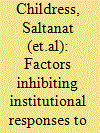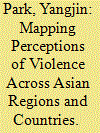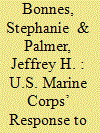|
|
|
Sort Order |
|
|
|
Items / Page
|
|
|
|
|
|
|
| Srl | Item |
| 1 |
ID:
190822


|
|
|
|
|
| Summary/Abstract |
The study identifies factors that limit effective institutional responses to domestic violence (DV) in Kyrgyzstan, in the context of recent legislative actions aimed at reducing DV through improvements in law enforcement, judicial processes and provision of social services. The study uses qualitative, grounded theory methods to analyse interviews and focus groups with 83 professionals working in these sectors. Two major themes emerge from the analysis: (1) barriers to effective institutional responses from internal challenges and constraints; and (2) social resources and challenges identified as important to provide a better collective response. The study highlights the need for capacity development within institutions and broader social learning to overcome existing barriers and better align outcomes with the intentions of recent legislation. Standardized training, awareness-raising, enhanced roles for educators and religious leaders, better coordinated social service provision, rehabilitation for victims and perpetrators, and family-centred school-based interventions are identified as targets for improving responsiveness.
|
|
|
|
|
|
|
|
|
|
|
|
|
|
|
|
| 2 |
ID:
193194


|
|
|
|
|
| Summary/Abstract |
Violence is increasing in Asia. However, limited research exists on the prevalence and types of violence across Asian regions and countries; a comprehensive study on a continental-scale in Asia has been understudied. Guided by the World Health Organization’s definition of violence, this study used World Values Survey Wave 7 (n = 35,435) to map the perceptions of the justifiability of three categories of violence (self-inflicted, interpersonal, collective) with five subtypes (suicide, intimate partner violence against wife, child abuse, violence toward other people, political violence) in six regions and 24 countries in Asia. Findings indicate that perceptions of the justifiability of violence are significantly different across regions in Asia. Perceptions of the justifiability of various types of violence differed across Asian countries. Considering the complexity and diversity of violence across Asian regions and countries, this study may be a cornerstone for violence research in Asia.
|
|
|
|
|
|
|
|
|
|
|
|
|
|
|
|
| 3 |
ID:
186345


|
|
|
|
|
| Summary/Abstract |
In this article, we show how the U.S. military treats domestic violence and sexual assault as distinct forms of abuse, which has particular consequences for victims of intimate partner sexual violence. We explore how a specific U.S. military branch, the Marine Corps, complicates these issues further by providing services to intimate partner sexual violence victims from two different programs. Analyzing military orders and documents related to Family Advocacy Program and Sexual Assault Prevention and Response program, interviews with eight military prosecutors, and the experiences of one military lawyer, we examine program and interactional-level factors that shape victim services, advocacy, and processes. We find that there are program differences in specialized services, coordinated services, and potential breaches of confidentiality related to victim’s cases. We recommend that the Marine Corps recognize the intersections of sexual violence and domestic violence and offer more tailored services to victims of intimate partner sexual violence.
|
|
|
|
|
|
|
|
|
|
|
|
|
|
|
|
|
|
|
|
|